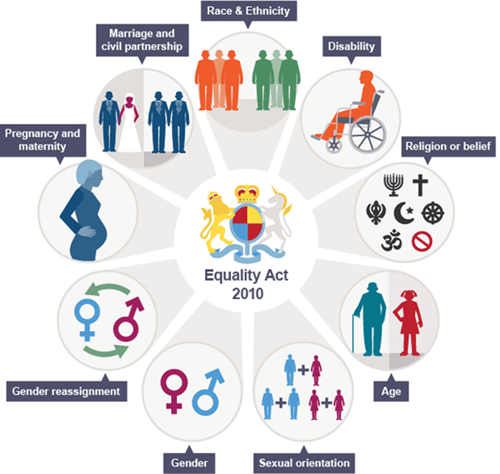Equality
The Equality Act 2010 applies to all schools and trusts and as the responsible body, governing boards have a duty to comply with the Act. As our school is a maintained school, the responsibility lies with the governing body.

The Act protects pupils and staff against discrimination, harassment, and/or victimisation based on the nine protected characteristics, which are:

In summary, the Act requires schools to:
- prevent unlawful behaviour which includes direct discrimination, indirect discrimination, harassment and victimisation
- make reasonable adjustments for individuals with disabilities
- publish equality information demonstrating compliance with the Act
- be aware of, and take into account, the public sector equality duty (PSED) when making decisions and taking action
Schools must publish information demonstrating compliance with the PSED annually and publish equality objectives every four years. At William Reynolds Primary School and Nursery, our equality objectives have been a collaborative exercise between the governing body and senior leaders.
Objectives should:
- contribute to the welfare of pupils and the school community.
- not be burdensome but do need to be specific and measurable.
- be used as a tool to help improve pupils’ experience of school.

Equality objectives for William Reynolds Primary School & Nursery for this academic year 2024-2025:
- To monitor and act upon any trends in attendance data
- To track the progress of all vulnerable groups to ensure appropriate intervention is given if required
- To ensure that Pupil Premium expenditure continues to have a positive impact on pupils targeted
- To ensure that relevant medical risk assessments are conducted for both pupils and staff in order for reasonable adjustments to take place when required.
- To ensure that an Education, Health and Care Plan (EHCP), is applied for, for children who have significant and long-term special educational needs.
We shall achieve these objectives by:
- Employing an Educational Welfare Officer to improve attendance and PA and offering appropriate support for the pupils and families.
- Identifying vulnerable groups and individuals and developing teaching and learning that is tailored to individual needs, thus ensuring good progress is sustained and achievement gaps can be closed.
- The continuation of nurture provision to support children with additional needs to attend school.
- Having rigorous and specific targeted interventions in place to support all children who need extra support.
- Regularly reviewing medical needs for all staff and pupils.
- Identifying and responding to SEND needs, and recognising that early identification improves long-term outcomes for the pupils.
- Maintaining the highest possible expectations of all pupils.

